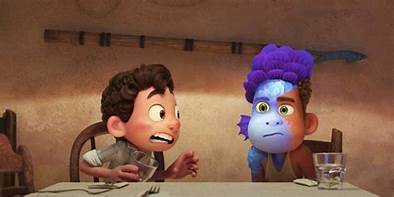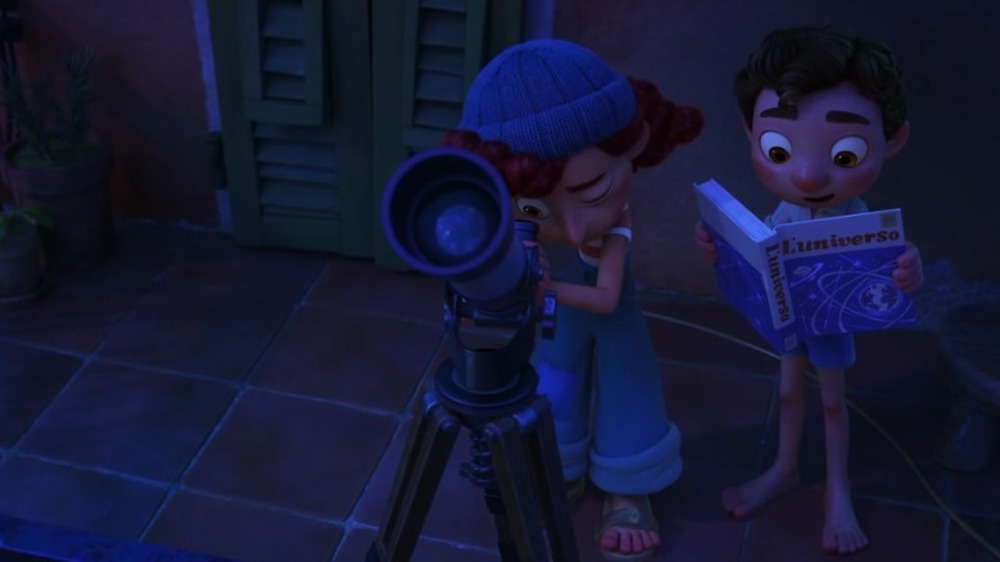With LUCA, Disney/Pixar takes us back under the sea with a film that makes no secret about wanting to tug at our heartstrings. Using sentiment and slapstick, it explores not only bullying, childhood bonding, and the importance of expanding one’s horizons, but also that delicate struggle between safeguarding one’s children, and letting them find their place in the world.
Our hero is Luca (Jacob Tremblay), a sinuous sea monster living in the Italian Riviera near the village of Portorossa. He’s a good boy, watching over the family’s school of bug-eyed fish that are bouncing balls of mischief, but he can’t shake the feeling that there is more to life than his father’s (Jim Gaffigan) obsession with show crabs and his mother’s (Maya Rudolph) rivalry with her neighbor in local competitions. When a few items drift down from the surface world where the land monsters live, his curiosity is piqued. His mother is horrified, his father is too preoccupied with the molting of his prize show crab to help, and his grandmother’s secret about having gone through the transition into a human by getting out of the water, and worse, visited the land monsters is revealed. When Luca meets Alberto (Jack Dylan Grazer), a sea monster his age who regularly transitions, Luca discovers the magic of air, sunshine, and gravity. In order to avoid being sent to the deep with his Uncle Ugo (Sascha Baron Cohen) by his overprotective mother, he takes the reverse plunge onto dry land, and is soon caught up in the quest for a Vespa scooter, and the family life of Giulia (Emma Berman) who is spending the summer with her gruff, but tender-hearted, one-armed fisherman father, Giacomo (Giacomo Gianniotti).

Luca, Alberto
The scooter represents freedom, and the plans Luca and Alberto spin about winning a local triathlon in order to buy one and see the world has all the wonder and innocence of childhood about it with none of the pesky details that reality throws at kids. Though they develop a friendship with Guilia, while also keeping their secret, the heart of this film is Luca’s hero-worship of Alberto, and the slow, inevitable, heart-breaking realization that the independent boy with no fear and big plans might not be all he seems, even if he knows a lot about walking on two legs, and how to get a free gelato. His ability to negotiate flatware is as iffy as his theory about what those dots of light are in the night sky. He also hasn’t figured out a way to avoid turning back into a sea monster when getting wet in the rain or dunked in the local fountain, a trope that makes for some dicey situations for the two in a surface work surprisingly fraught with surprise moistenings. Nor does Alberto what to do when the village, unsettled by so many sea monster sightings, puts a bounty on them.

Luca, Guilia
LUCA takes obvious delight in its Italian setting. The triathlon includes biking, swimming, pasta-eating. The soundtrack is rife with bouncy mid-century Italian pop songs, and it would have been wrong to not include that reference to Marcello Mastroianni. So wrong. It also takes obvious delight in having Guilia turn Luca onto the world of science, even as she also stands up to Ercole (Saverio Raimondo), a perpetually 16-year-old budding Mussolini with two henchman and five triathlon wins under his belt.
Never pedantic, even when making its salient points about tolerance and keeping an open mind, LUCA is a gentle film about serious subjects. Beautifully rendered in the rich colors of the Mediterranean, and nicely paced between perfectly timed physical humor, action, and introspection, it follows an time-honored path to an ending that will warm the cockles of your cardiac organ while also making you question the best way to eat pasta.
Your Thoughts?